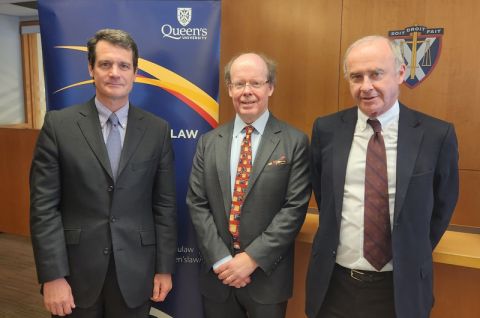
Rob Frater, KC, Law’84, has a well-deserved reputation for being concise and for cutting to the chase in his legal arguments. Those traits were on full display when Justice Canada’s former Chief General Counsel (2016-2021) visited Queen’s Law on Jan. 30 to deliver the 2023 McCarthy Tétrault LLP Lecture on Ethics and Professionalism.
This year’s talk, whimsically titled, “The Two Michaels, the Donald, and the Tech Tycoon’s Daughter: Litigation in the Minefield of U.S.A. v. Meng,” was a master class on the evolving role, conduct, and responsibilities of Crown counsel in criminal proceedings. This is a topic that Frater noted is often written about, but not always “by people who have to actually apply the principles in practice.” There’s no better example of that than the Meng Wanzhou case, which was multi-faceted, politically sensitive, and legally complex.
Frater, who served as the lead Crown counsel in the high-profile 34-month-long extradition proceedings involving Meng Wanzhou, the CFO of Chinese tech giant Huawei, drew upon his experiences in that case, and he shared his insights into the process and what transpired. This made for a talk that was as enlightening as it was entertaining.
As Frater explained, a crucial principle in Canadian law as determined by the Supreme Court of Canada is that the administration of justice is paramount. That being so, the role of the Crown counsel isn’t to obtain a conviction, but rather to put before the court any and all credible evidence that’s related to a defendant’s alleged wrongdoing. Part and parcel with that is the notion that the Crown has no client per se. “And that was the proverbial elephant in the room in the Meng proceedings,” Frater explained.
It was evident to everyone involved that even though they weren’t represented by counsel in the courtroom, “the two Michaels” – Michael Kovrig and Michael Spavor, the two Canadians whom Chinese authorities jailed in retaliation for Meng’s arrest – were vitally interested in the legal proceedings. They weren’t the only ones.
No less attentive, albeit for markedly different reasons, were officials from the RCMP, the Canadian Border Services Agency (CBSA), and the Department of Global Affairs, politicians at the highest levels in Ottawa and Washington, and the American prosecutors on whose behalf CBSA officials had acted when they detained Meng on Dec. 1, 2018, at Vancouver International Airport.
“In a sense the United States, as the requesting entity, was also a client,” said Frater. And complicating that reality were statements made by then-U.S. President Donald Trump who’d suggested there might be “a deal” to be made between Washington and Beijing that would see charges against Meng dropped in return for Chinese trade concessions.
Frater, like other senior Justice Department officials was acutely aware of all this and of the heightened sensitivities, particularly since in Canadian law the Attorney General often is referred to as the “guardian of the public interest.”
Coincidentally, at the same time the Meng proceedings were underway in Vancouver, on the national stage a heated political debate was raging about the at-time quixotic relationship between the Attorney General and the Minister of Justice with its inherent potential for political interference in criminal proceedings. This led to much discussion in the halls of government, in the courts, and in the media of “the Shawcross principle” – the notion that in the Westminster system of government, when deciding whether or not to launch criminal proceedings the Attorney-General has unfettered authority consider what’s in “the public interest.”
Given the myriad factors involved in such decisions, questions of political pressure and even of political interference can and do arise. Frater and his colleagues were acutely aware of this, and so they chose their words carefully whenever they spoke about the case – in court or out – for fear that a wrong word or phrase would spark an international incident.
Traditionally, Crown counsel have tended to refrain from making public comments on any case that’s before the courts; however, as the Meng case made clear, the role of Crown counsel has evolved, and it continues to do so. Said Frater, “In this instance, the amount of time that Crown counsel spent with communications people, fashioning public statements was remarkable.”
The danger of political interference is a constant in the criminal justice process, and yet Frater explained that the Shawcross principle doesn’t insist that Crown counsel be “hermetically sealed.” Any attempt to do so nowadays would be difficult, if not impossible when as Frater said, “Those outside government are more than willing to state opinions and offer advice on how proceedings should be conducted.”
In the post-lecture question and answer session, Frater was asked how it’s possible to ensure that the values he’d discussed in his lecture could be maintained and that a prosecutorial culture that makes “winning and losing” all-important doesn’t emerge – as it often does in the U.S., where District Attorneys are elected.
“What has changed over my three decades in government is that there is much more of a commitment to training . . . prosecutors get a lot more training about advocacy skills, professionalism issues, training about racism and indigenous issues,” Frater replied.
“Another thing we have in Canada is a long history of examination of wrongful convictions, and you know if you read the reports on why wrongful convictions occur, the usual suspects always come back. Among them are errors by prosecutors who can be subject to biases or tunnel vision because when you work on something for a long time, you come to believe it.”
Listen to a podcast of Rob Frater’s lecture.
By Ken Cuthbertson, Law’83